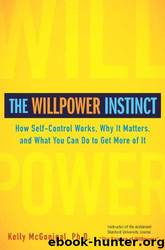The Willpower Instinct: How Self-Control Works, Why It Matters, and What You Can Do to Get More of It by Kelly McGonigal

Author:Kelly McGonigal
Language: eng
Format: azw3, mobi
ISBN: 9781583335086
Publisher: Avery Trade
Published: 2013-12-30T18:30:00+00:00
This week, pay special attention to how you handle any willpower failure. Do you criticize yourself and tell yourself that you’ll never change? Do you feel like this setback reveals what is wrong with you—that you’re lazy, stupid, greedy, or incompetent? Do you feel hopeless, guilty, ashamed, angry, or overwhelmed? Do you use the setback as an excuse to indulge further?
BREAKING THE WHAT-THE-HELL CYCLE
Two psychologists—Claire Adams at Louisiana State University and Mark Leary at Duke University—set up a study guaranteed to trigger the what-the-hell effect. They invited weight-watching young women into the laboratory, then encouraged them to eat doughnuts and candy in the name of science. These researchers had an intriguing hypothesis about how to break the what-the-hell cycle. If guilt sabotages self-control, they thought, then maybe the opposite of guilt would support self-control. Their unlikely strategy: Make half these doughnut-eating dieters feel better about giving in.
The women were told that they would be participating in two separate studies: one on the effect of food on mood, and a taste test of several different candies. In the first study, all of the women were asked to choose either a glazed or chocolate doughnut and finish the whole thing within four minutes. They were also asked to drink an entire glass of water—the researchers’ trick to make sure they felt uncomfortably full (a tighter waistband is good for inducing guilt). Then the women filled out surveys about how they felt.
Before the candy taste test, half of the women received a special message designed to relieve their guilt. The experimenter mentioned that participants sometimes felt guilty about eating a whole doughnut. The experimenter then encouraged each participant not to be too hard on herself, and to remember that everyone indulges sometimes. The other women got no such message.
Then came the test of whether self-forgiveness would break the what-the-hell cycle. The experimenter served each dieter three large bowls of candy—peanut-butter-and-chocolate Reese’s Poppers, fruit-flavored Skittles, and York Peppermint Patties—chosen to appeal to any sweet tooth. The women were asked to sample each candy in order to rate it, and were invited to eat as much or as little as they liked. If the women still felt guilty about eating the doughnut, they should say to themselves, “I already broke the diet, so what does it matter if I inhale these Skittles?”
After the taste test, the experimenter weighed the candy bowls to find out how much each participant had eaten. The self-forgiveness intervention was a clear success: The women who received the special message ate only 28 grams of candy, compared with almost 70 grams by women who were not encouraged to forgive themselves. (For reference, a single Hershey’s Kiss is 4.5 grams.) Most people are surprised by this finding. Common sense says that the message “Everyone indulges sometimes; don’t be too hard on yourself” will only give dieters permission to eat more. And yet getting rid of guilt kept the women from overindulging in the taste test. We may think that guilt motivates us to correct our mistakes, but it’s just one more way that feeling bad leads to giving in.
Download
The Willpower Instinct: How Self-Control Works, Why It Matters, and What You Can Do to Get More of It by Kelly McGonigal.mobi
This site does not store any files on its server. We only index and link to content provided by other sites. Please contact the content providers to delete copyright contents if any and email us, we'll remove relevant links or contents immediately.
The Compound Effect by Darren Hardy(8949)
Wonder by R.J. Palacio(8572)
Atomic Habits: Tiny Changes, Remarkable Results by James Clear(8326)
Becoming Supernatural by Dr. Joe Dispenza(8204)
Wonder by R. J. Palacio(8098)
Change Your Questions, Change Your Life by Marilee Adams(7760)
The Road Less Traveled by M. Scott Peck(7594)
Born to Run: by Christopher McDougall(7121)
Daring Greatly by Brene Brown(6504)
Big Magic: Creative Living Beyond Fear by Elizabeth Gilbert(5756)
Grit by Angela Duckworth(5605)
The Slight Edge by Jeff Olson(5410)
Men In Love by Nancy Friday(5234)
The Wisdom of Sundays by Oprah Winfrey(5153)
You Are a Badass at Making Money by Jen Sincero(4925)
Fear by Osho(4727)
The Miracle Morning by Hal Elrod(4713)
The Four Tendencies by Gretchen Rubin(4594)
Rising Strong by Brene Brown(4451)
